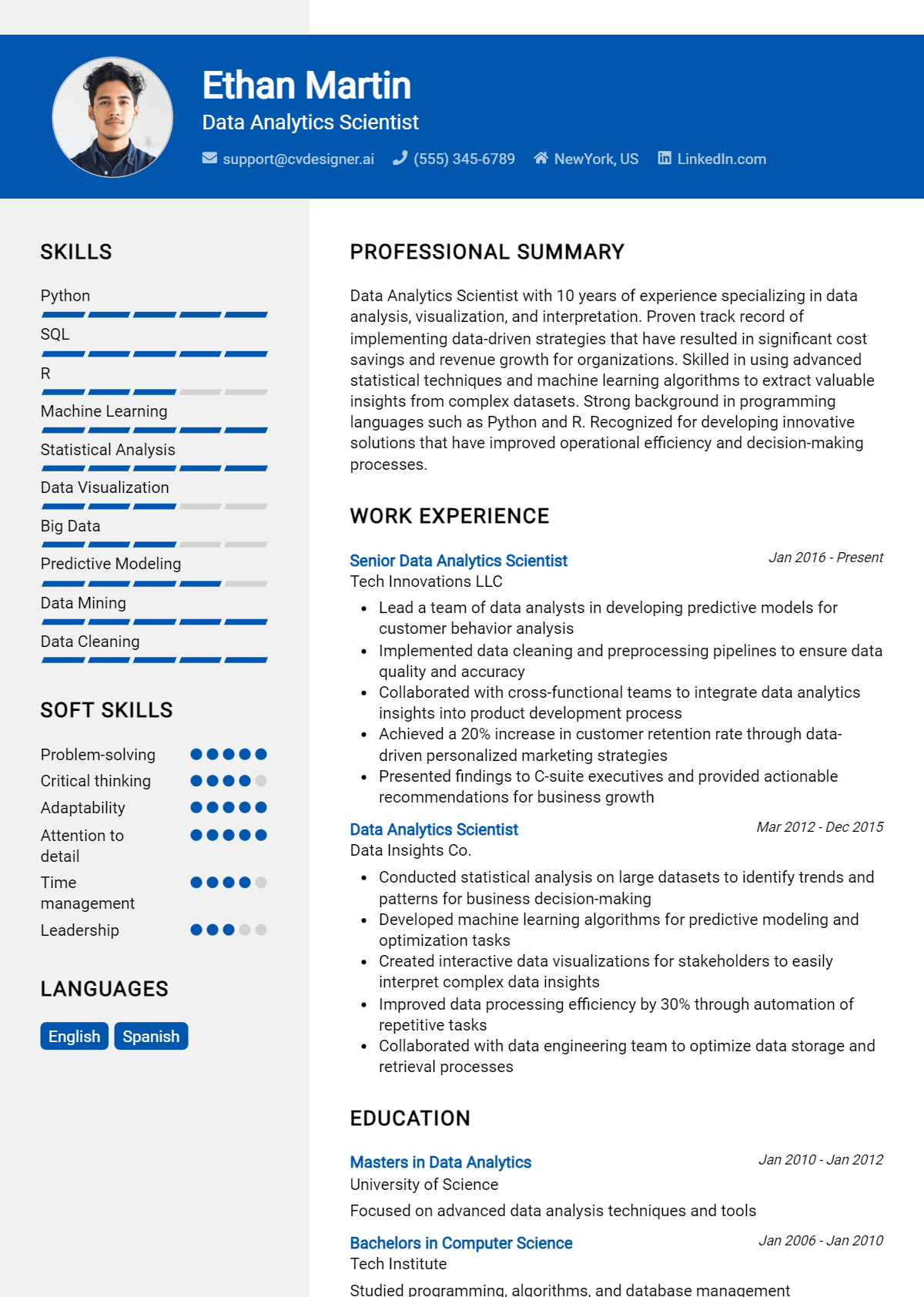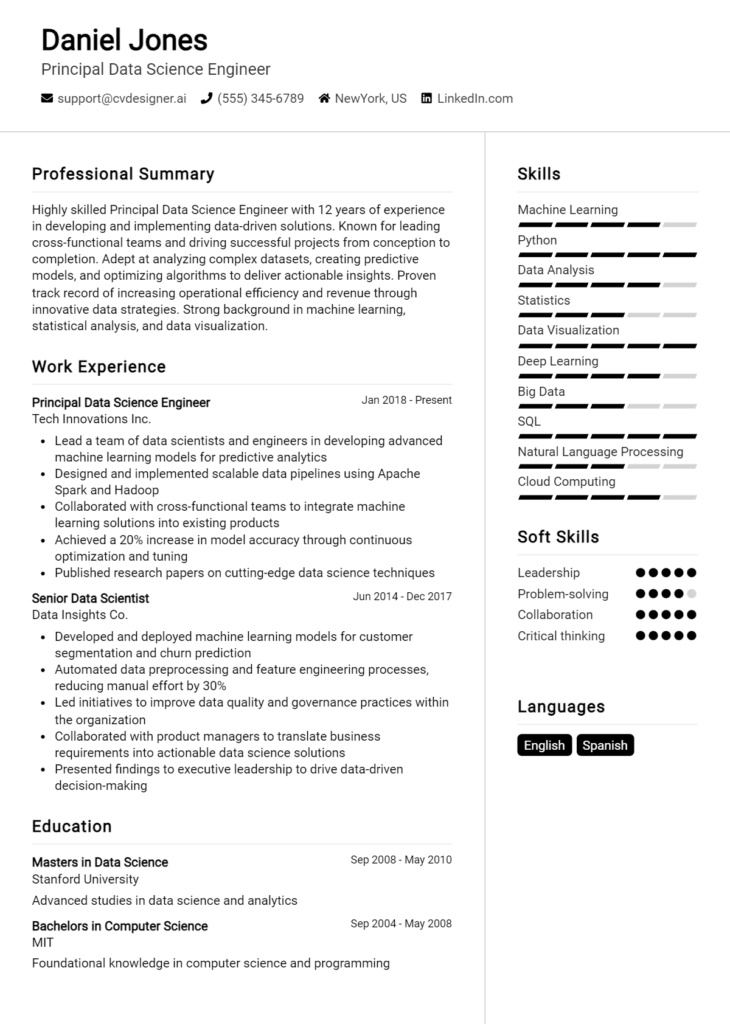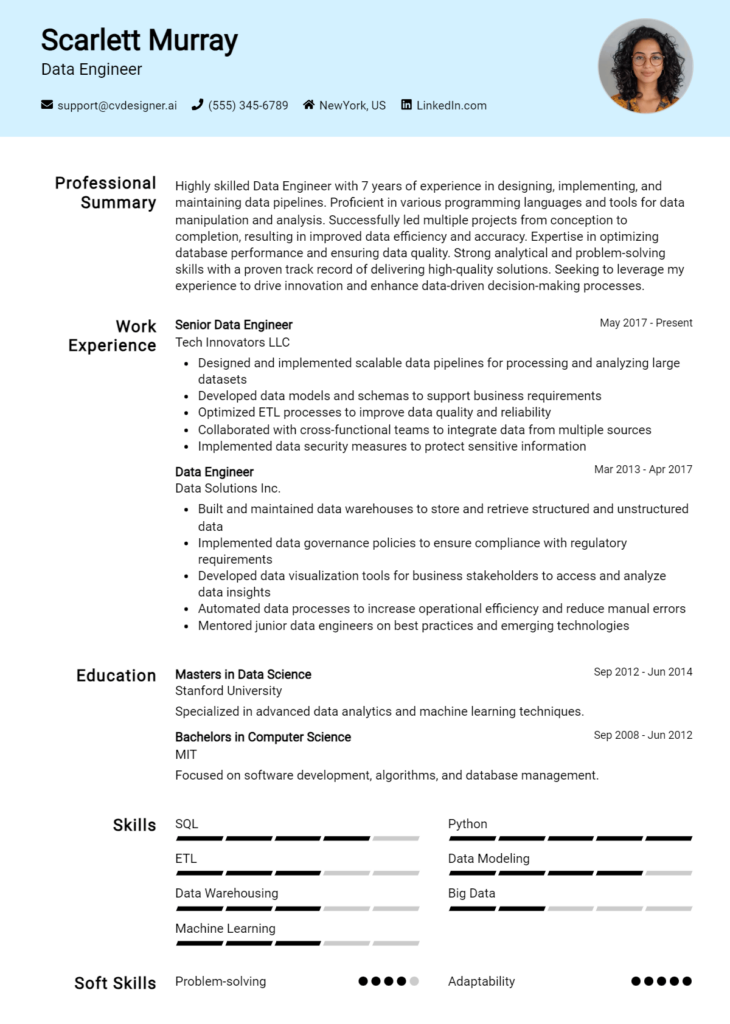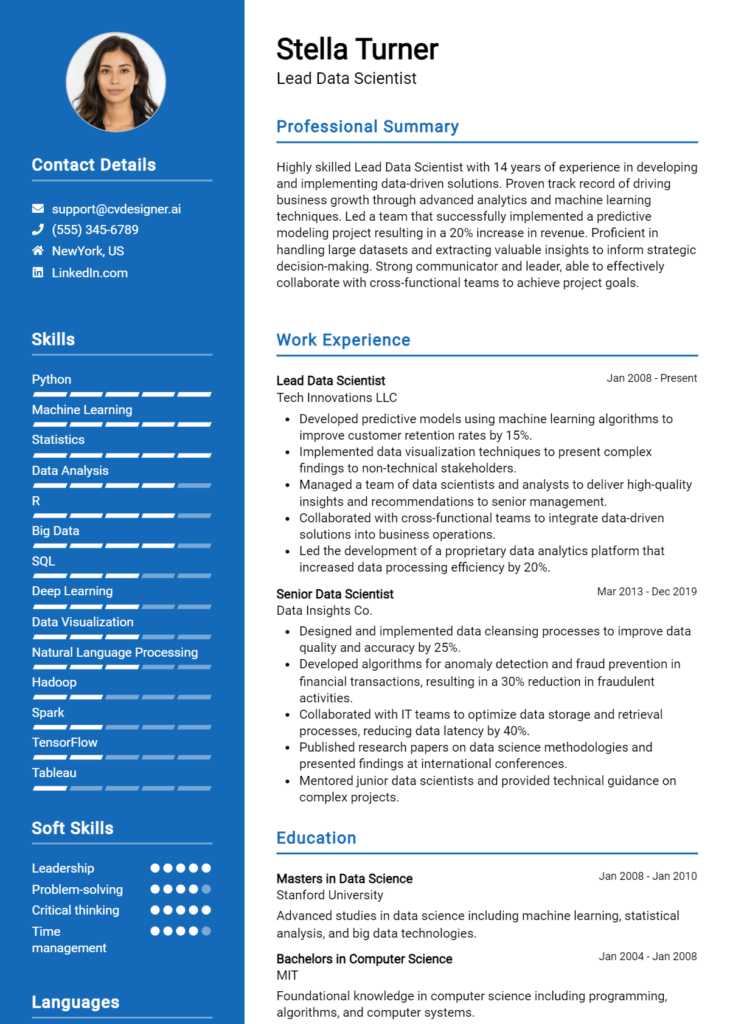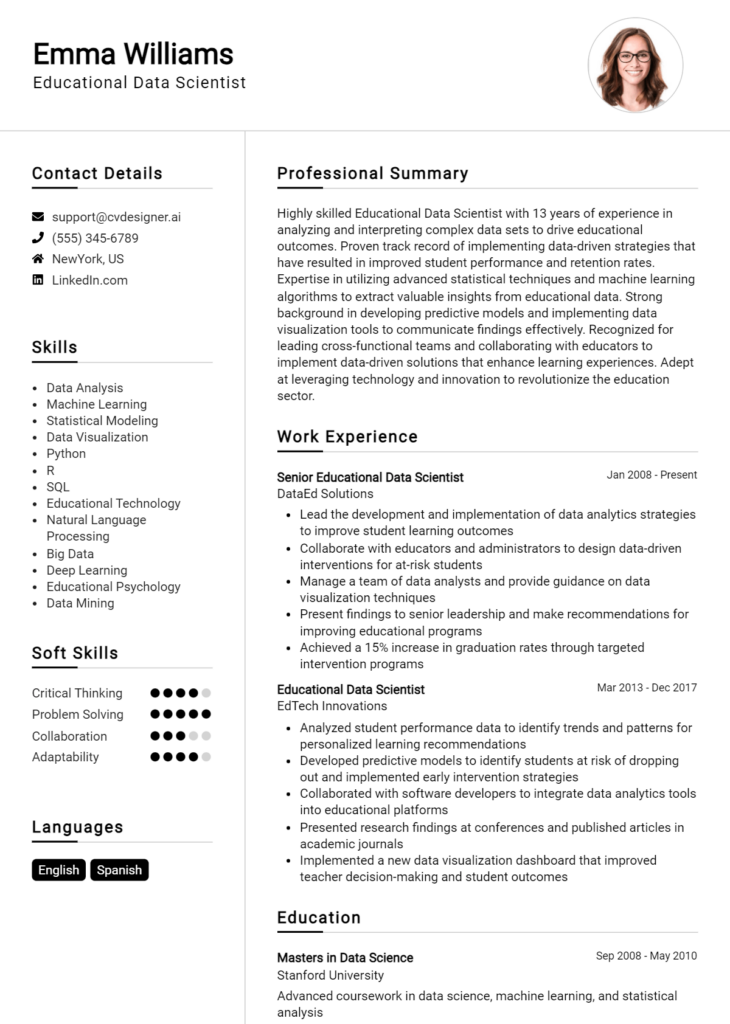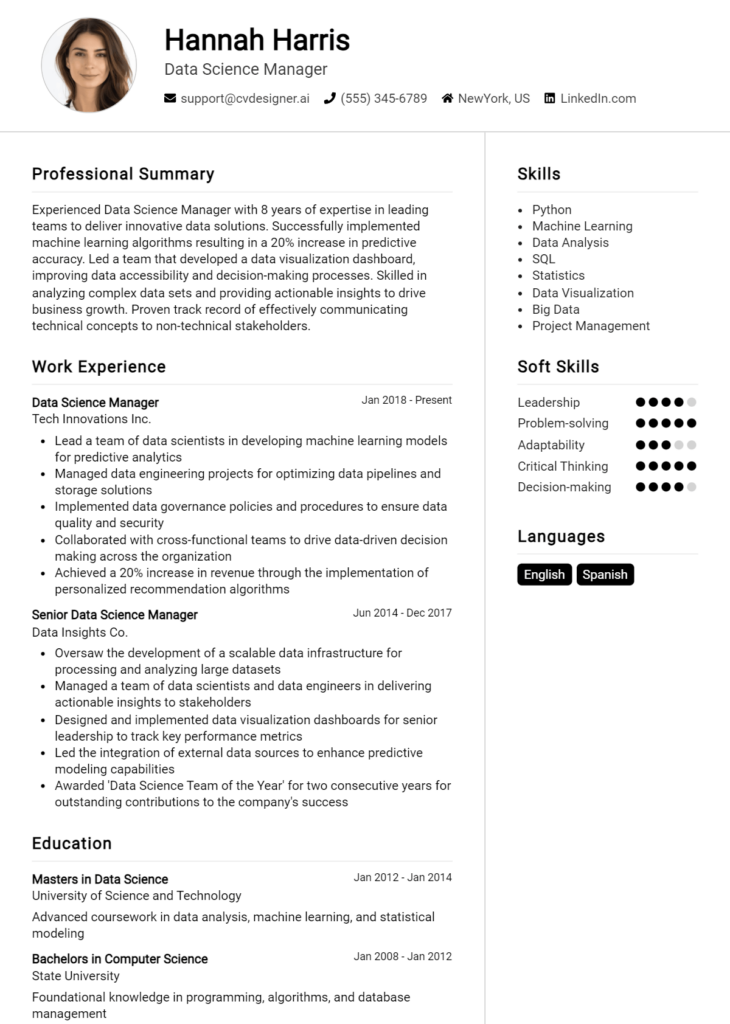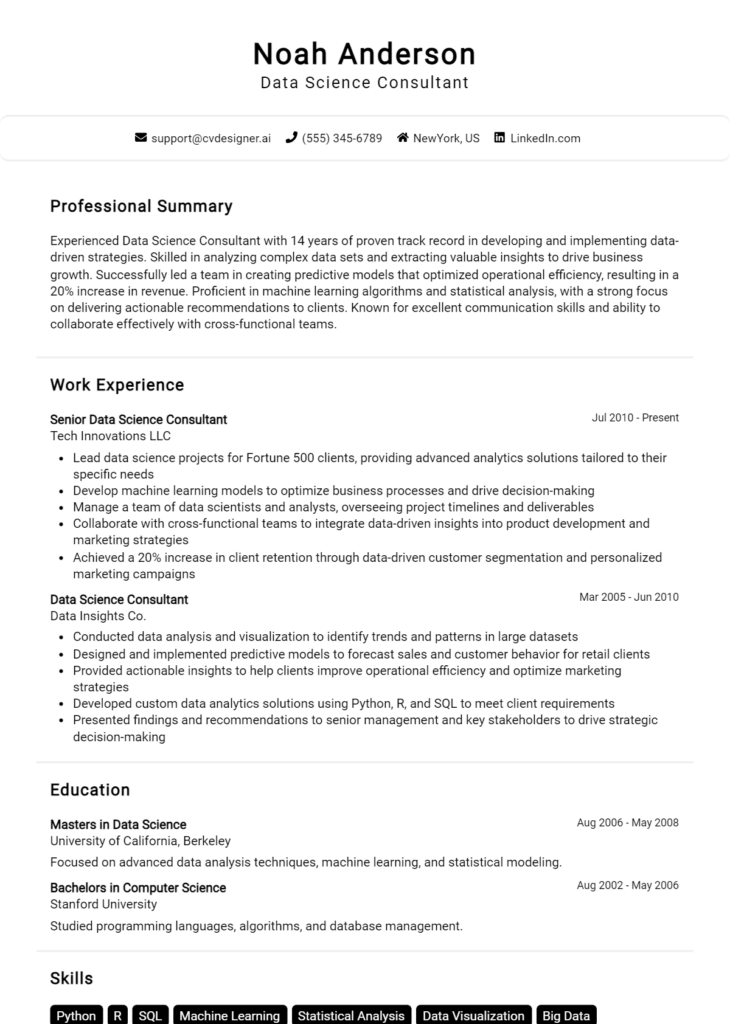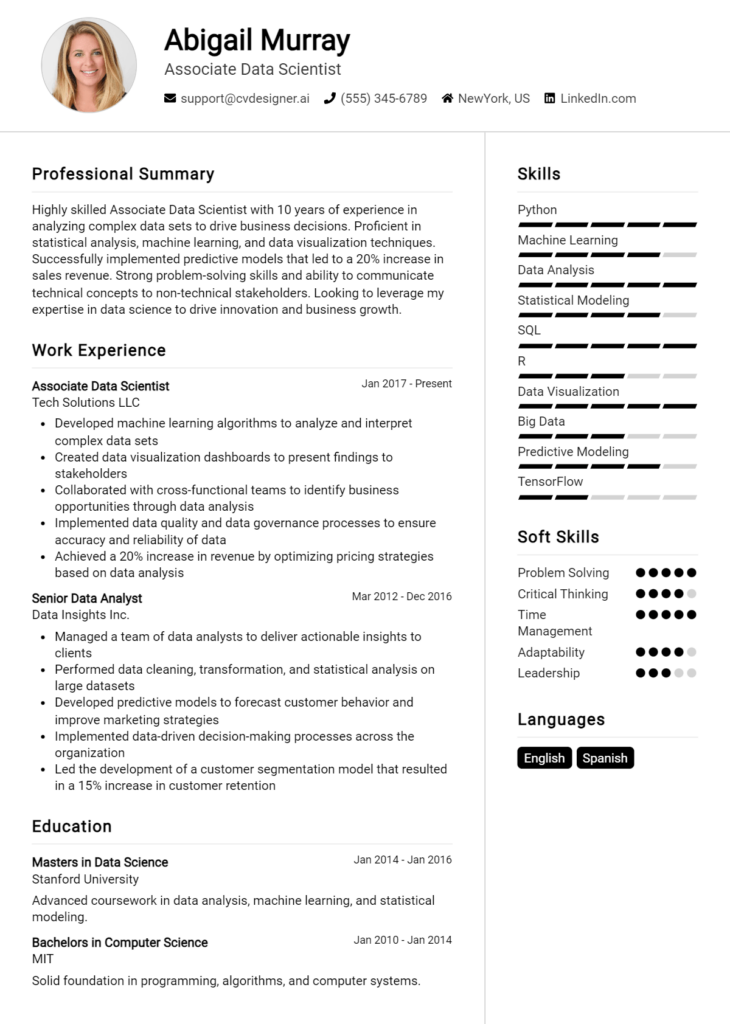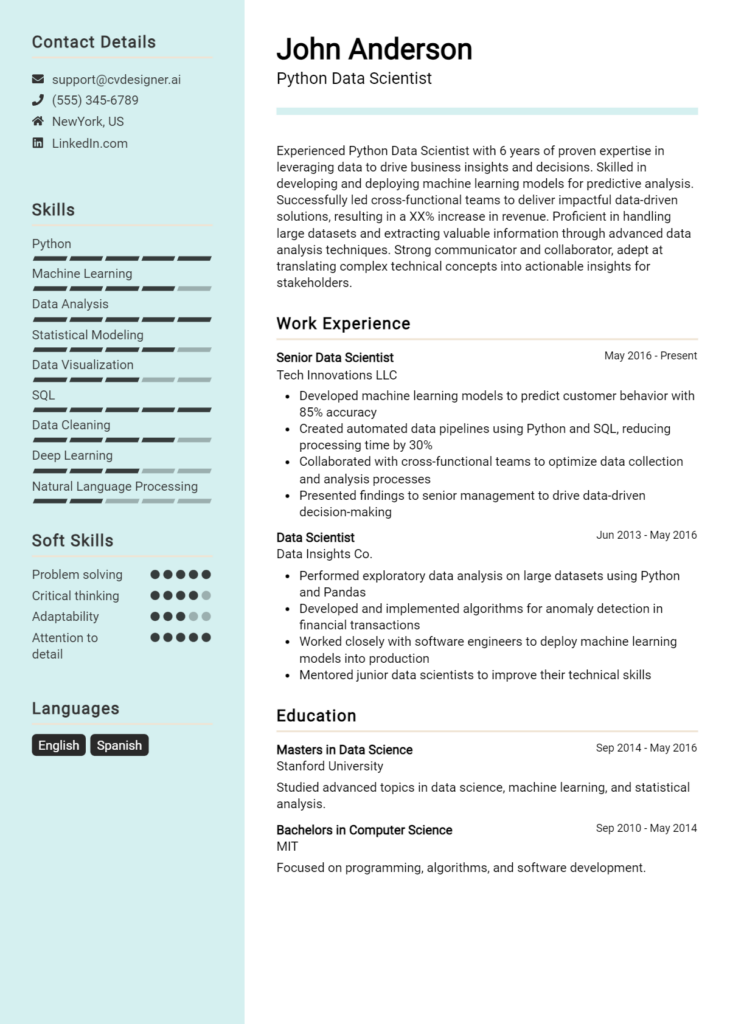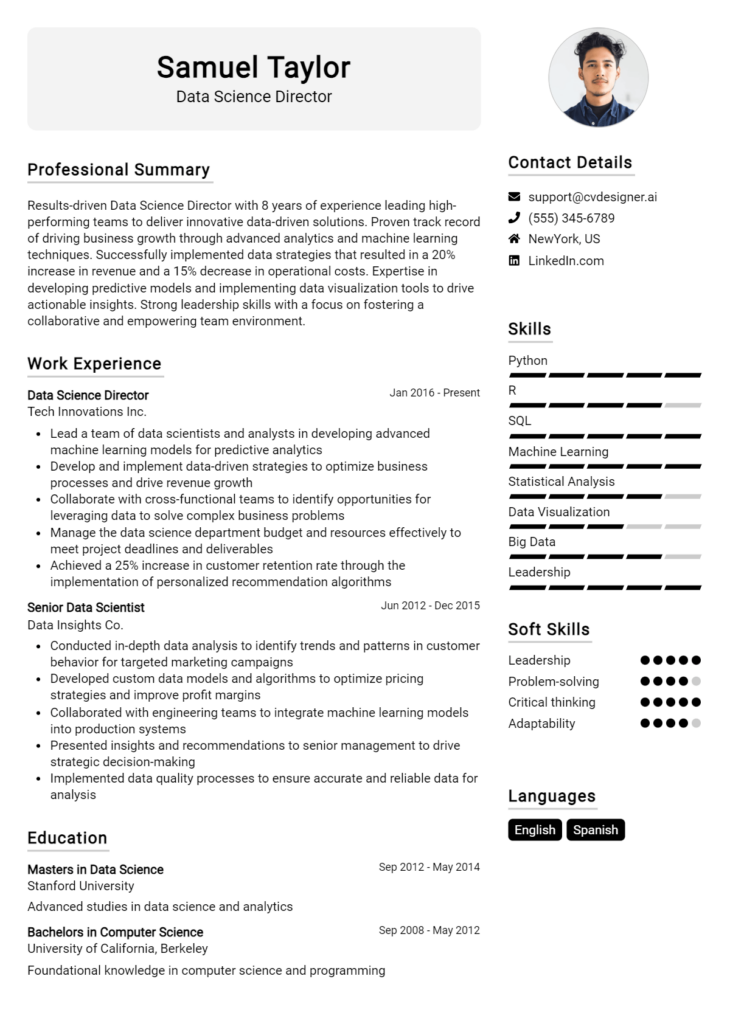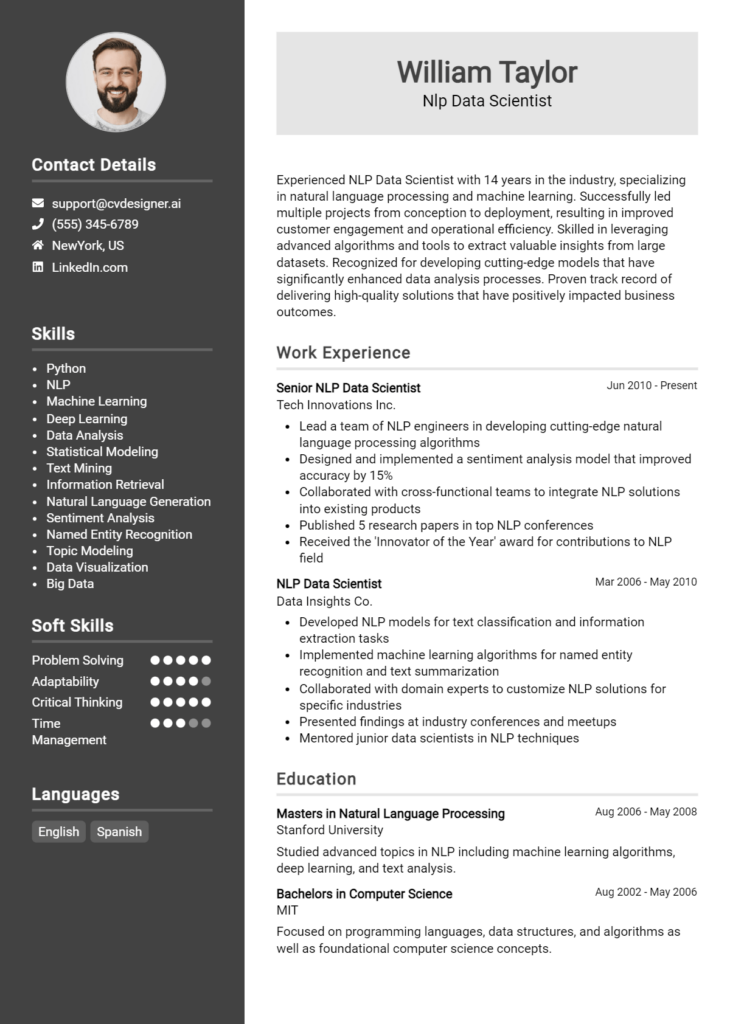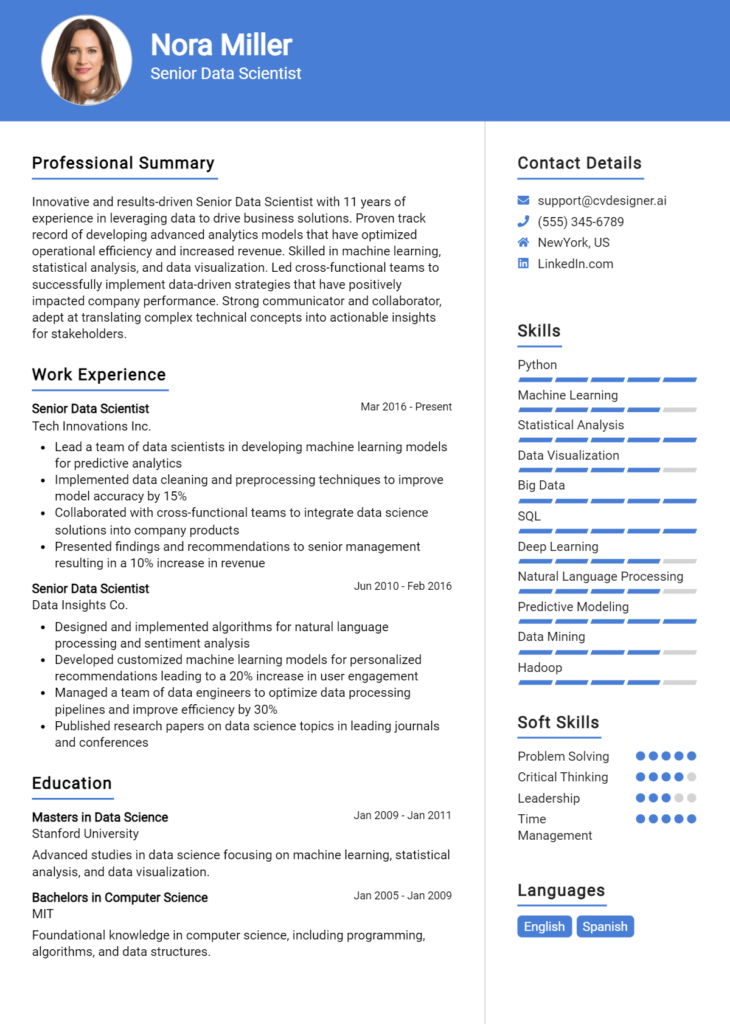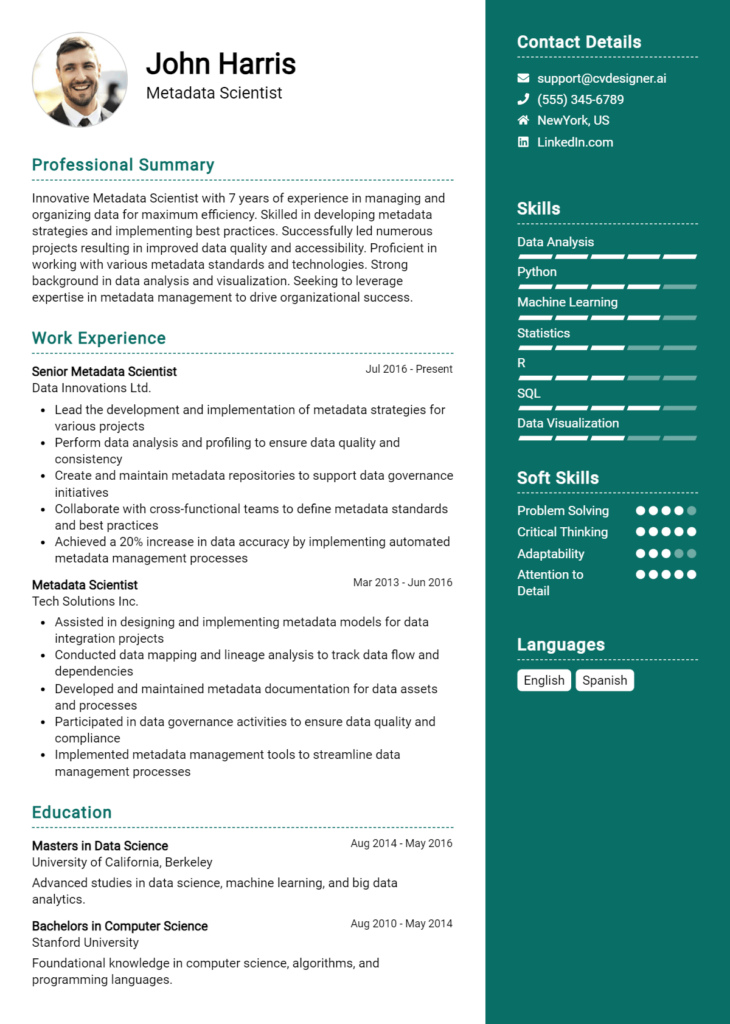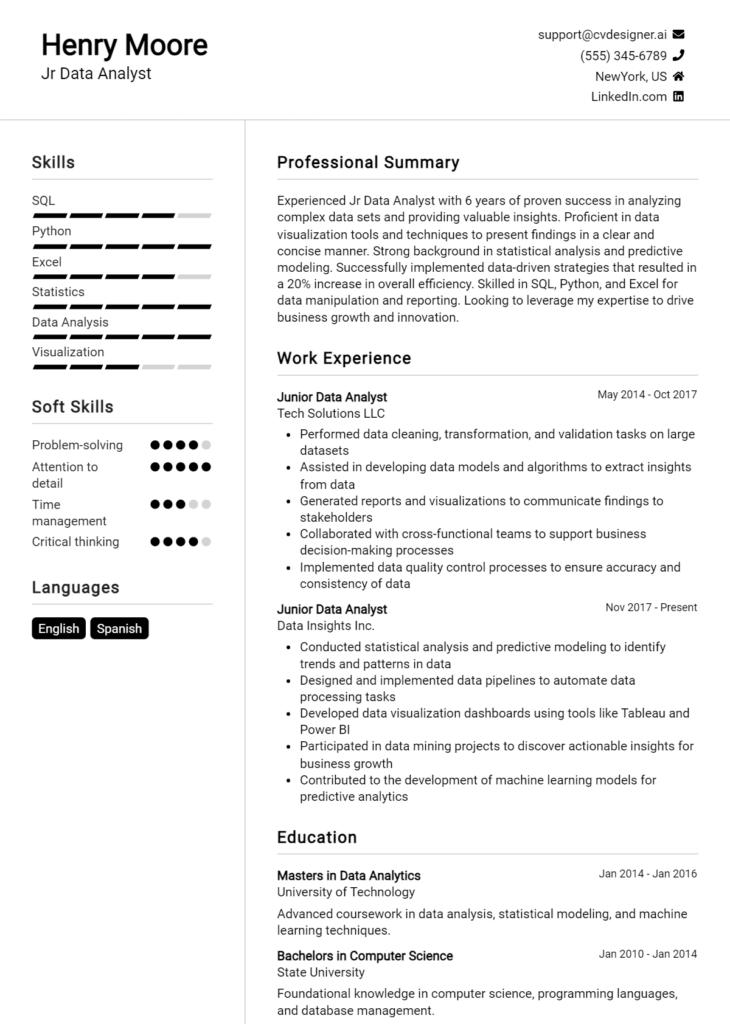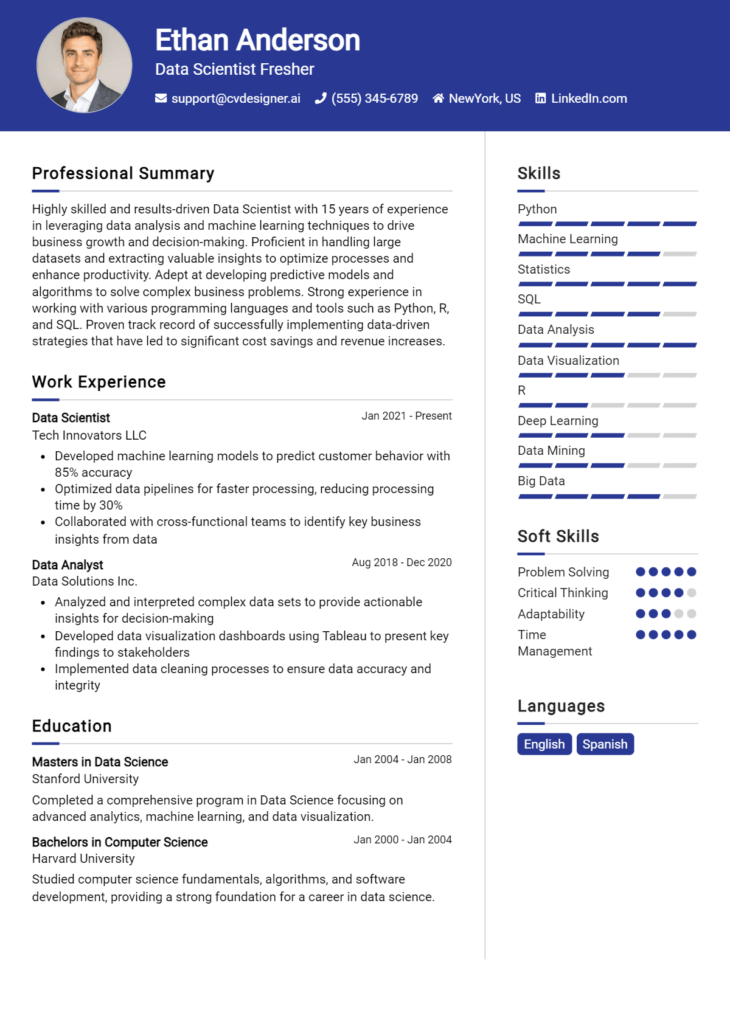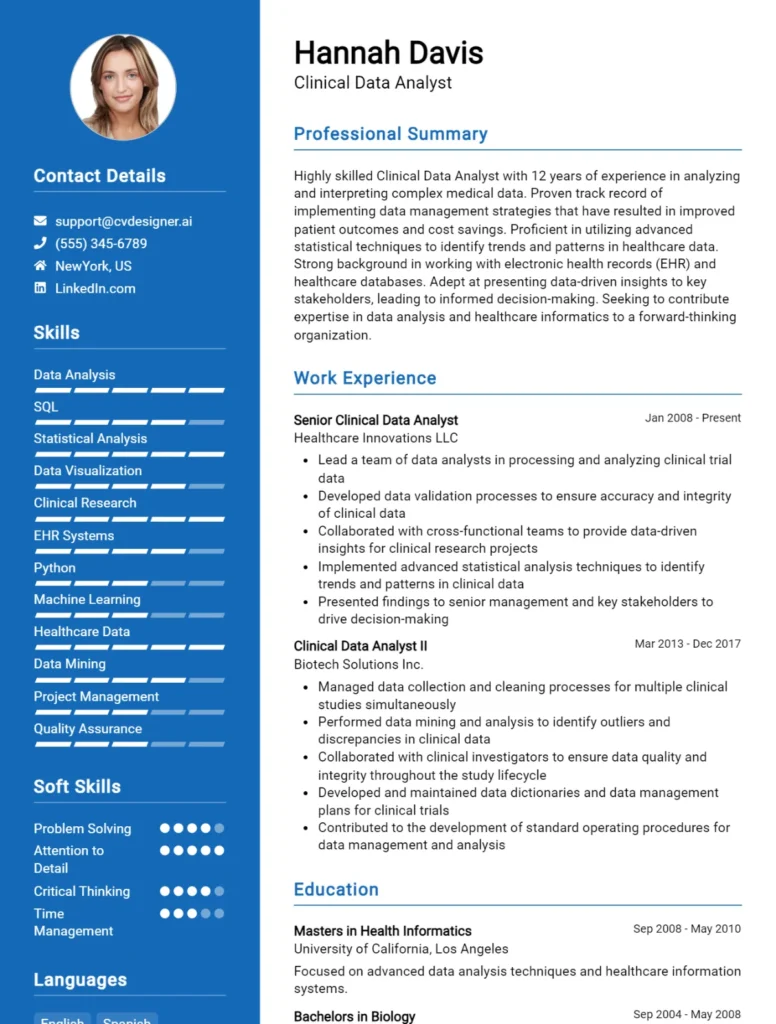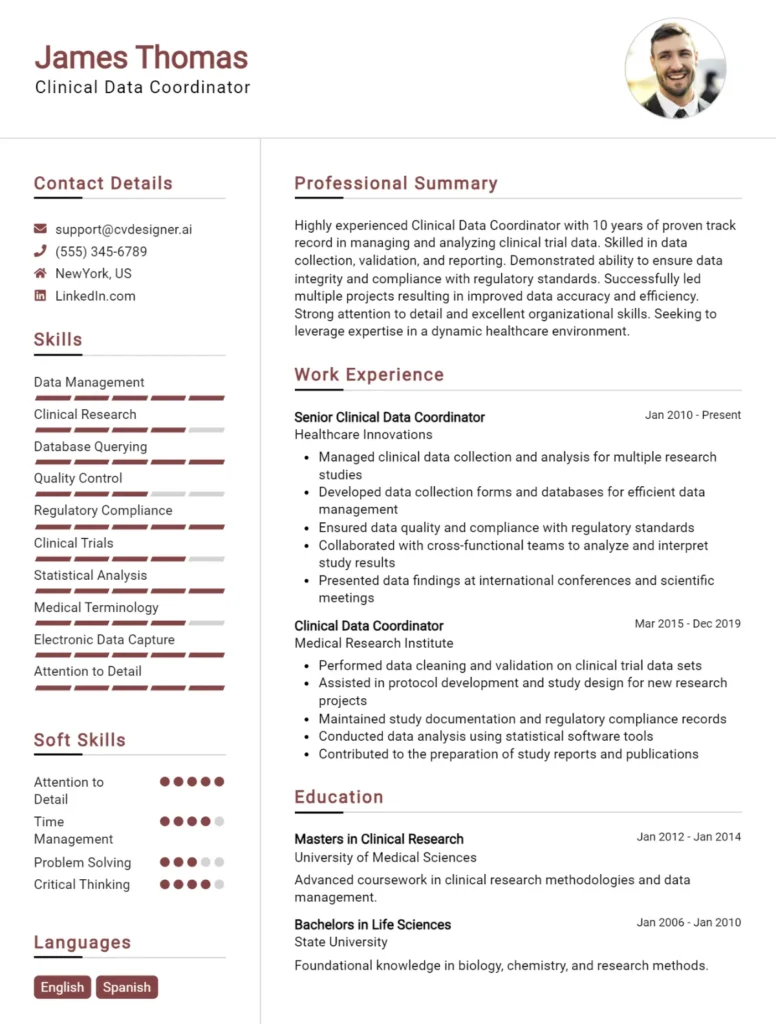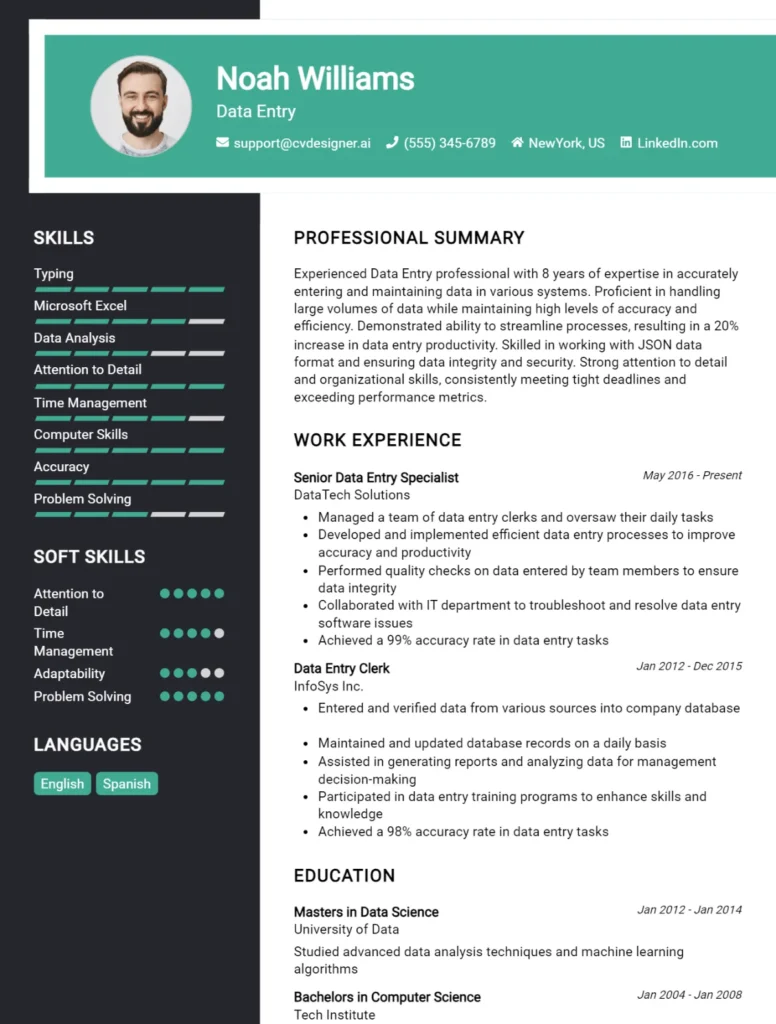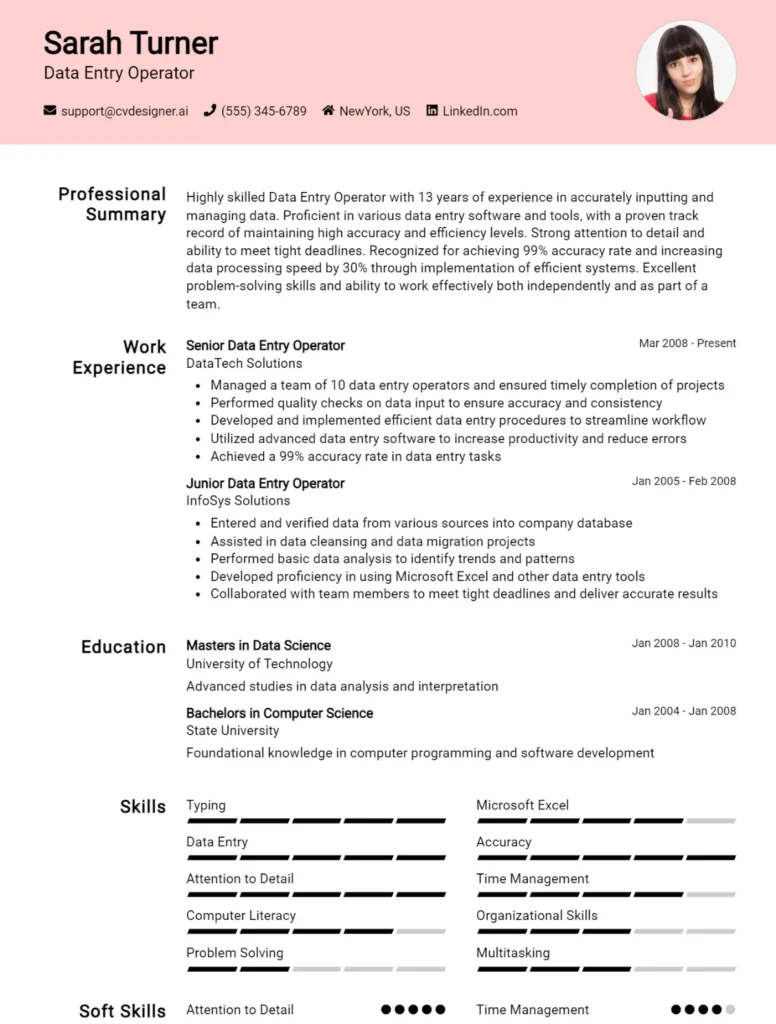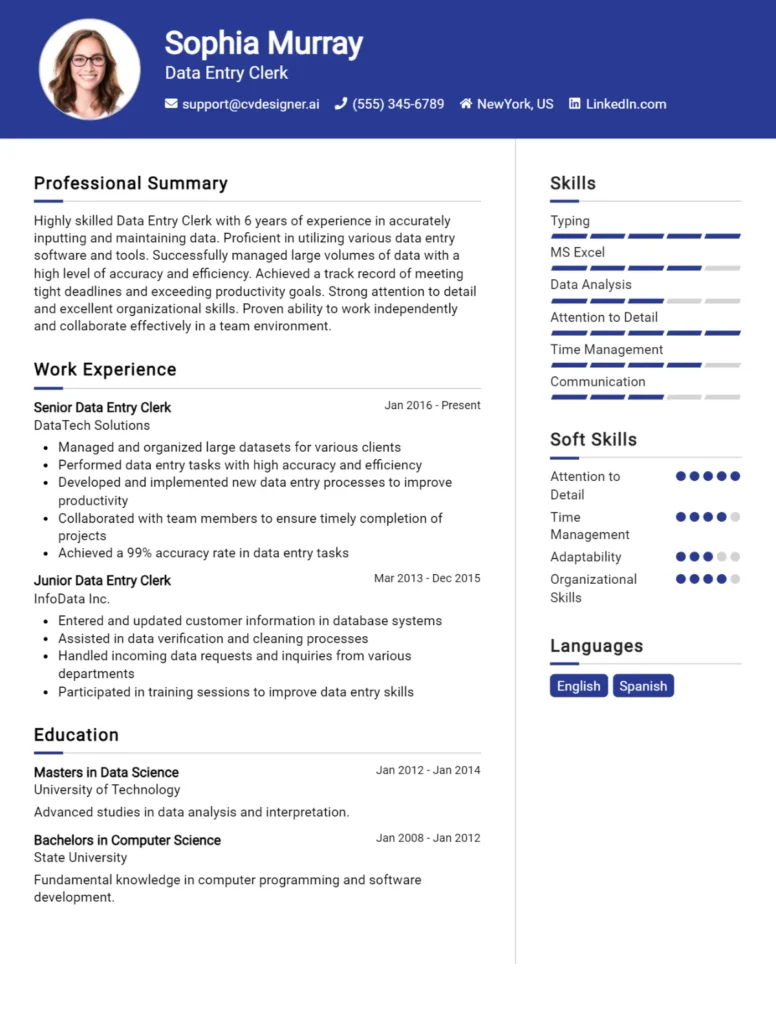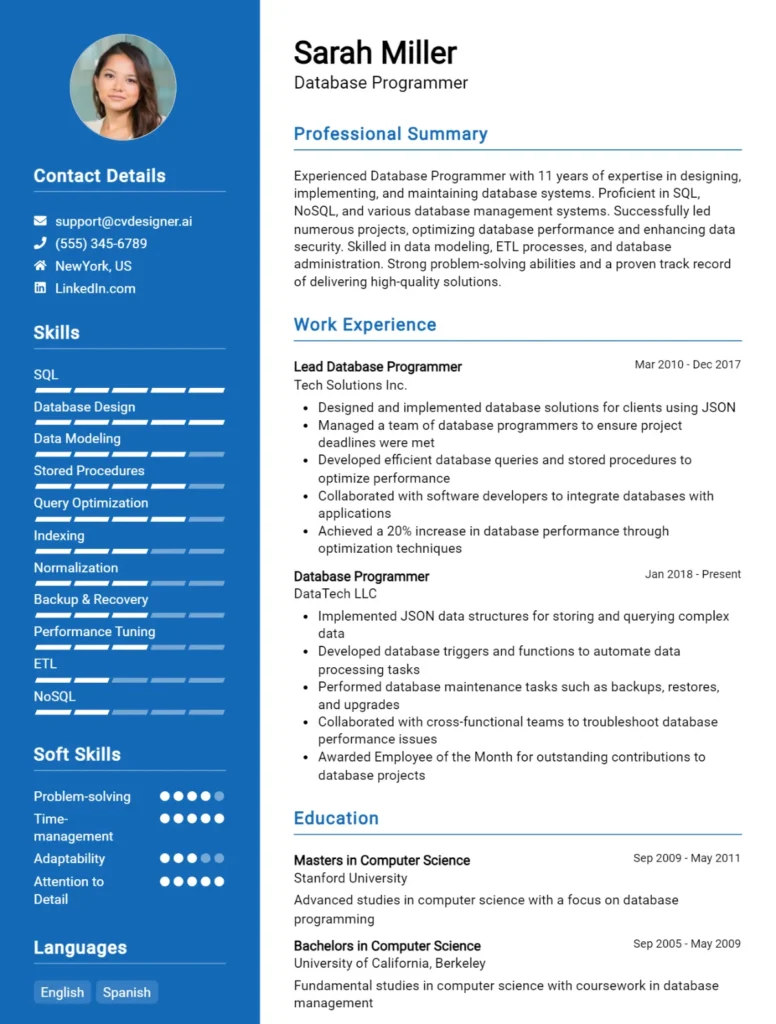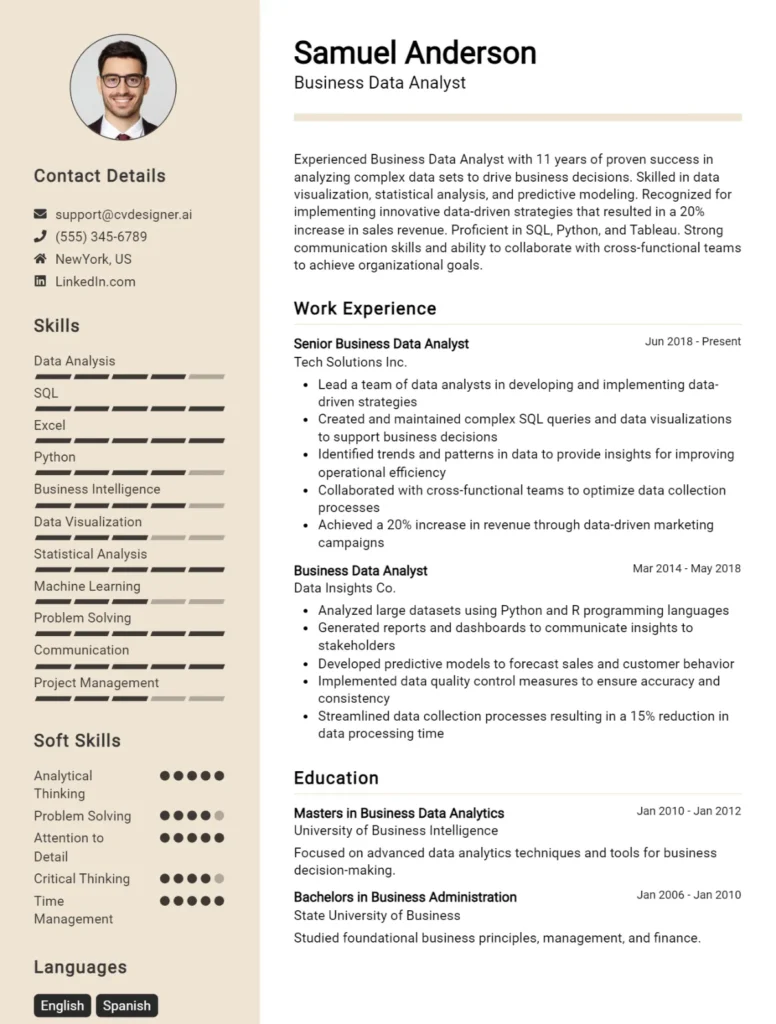Most Popular Data Analytics Scientist CV Examples
Explore additional Data Analytics Scientist CV samples and guides and see what works for your level of experience or role.
In the rapidly evolving field of data analytics, crafting a standout CV is essential to capture the attention of potential employers. A well-structured and informative CV not only showcases your technical skills and experience but also reflects your analytical mindset and problem-solving abilities. This guide will walk you through the essential elements of writing a compelling CV specifically tailored for a Data Analytics Scientist role. By the end, you will have a clear understanding of how to present your qualifications effectively, along with a practical CV example to inspire your own document. Here’s what you can expect to learn:
- Understanding the Role: Insights into the key responsibilities of a Data Analytics Scientist.
- Essential Skills: Highlighting the technical and soft skills that employers look for.
- CV Structure: The optimal format and layout for clarity and impact.
- Tailoring Your CV: Strategies for customizing your CV to match job descriptions.
- Quantifying Achievements: How to effectively showcase your accomplishments with metrics.
- Common Mistakes: Avoiding pitfalls that could hinder your chances of landing an interview.
- Final Touches: Tips on proofreading and formatting to enhance professionalism.
Prepare to elevate your CV from ordinary to extraordinary and position yourself as a top candidate in the competitive data analytics landscape!
What is a Data Analytics Scientist CV?
A CV for a Data Analytics Scientist serves as a comprehensive showcase of an individual's skills, experience, and achievements in the field of data analytics. It typically includes sections such as education, work experience, technical skills, and relevant projects. The primary function of this CV is to communicate one's proficiency in data manipulation, statistical analysis, and interpretation of complex datasets. It is essential for highlighting the ability to utilize various tools and programming languages, such as Python, R, and SQL, which are critical for data analysis tasks. A well-crafted CV can significantly enhance a candidate's chances of securing an interview, making it a vital step in the job application process.
The importance of a CV extends beyond merely listing qualifications; it acts as a personal marketing tool that reflects a candidate's understanding of the data analytics landscape. For aspiring Data Analytics Scientists, having a polished and tailored CV can differentiate them from others in a competitive job market. Utilizing resources like a cv writing guide can help in structuring the CV effectively, while a cv maker can assist in creating visually appealing and professional layouts. Ultimately, a strong CV not only conveys technical expertise but also demonstrates the candidate's commitment to their career and readiness to contribute to their prospective employer's success.
Key Components of a Data Analytics Scientist CV
- Contact Information: Include your full name, phone number, email address, and LinkedIn profile link to ensure potential employers can easily reach you.
- Professional Summary: A brief overview of your experience, skills, and what you can bring to the role of a Data Analytics Scientist.
- Technical Skills: Highlight your proficiency in data analysis tools and languages such as Python, R, SQL, and data visualization software. For a comprehensive list of essential skills, consider including both hard and soft skills relevant to the role.
- Education: Detail your academic background, including degrees obtained, institutions attended, and relevant coursework or certifications in data science or analytics.
- Certifications: List any relevant certifications such as Google Data Analytics Professional Certificate, Microsoft Certified: Data Analyst Associate, or other industry-recognized credentials.
- Work Experience: Provide a detailed account of your previous employment, focusing on roles related to data analysis. Highlight your accomplishments and contributions in each position by referencing specific projects or tools used. For further guidance, check out the section on work experience.
- Projects: Include a section for significant projects that showcase your data analysis abilities. Describe the project scope, tools used, and the impact of your work on the organization.
- Publications and Research: If applicable, mention any relevant research papers, articles, or presentations you have authored or contributed to in the field of data analytics.
- Professional Affiliations: List membership in any relevant professional organizations, such as the Data Science Society or the American Statistical Association, to demonstrate your commitment to the field.
- Awards and Recognition: Highlight any awards or recognition you have received for your work in data analytics, showcasing your achievements and contributions to the industry.
- Languages: If applicable, mention any additional languages you speak, especially if they can be beneficial in a diverse workplace or for global data projects.
- References: Consider including references or a statement that they are available upon request, ensuring potential employers can verify your experience and skills.
Sample Data Analytics Scientist CV for Inspiration
John Doe
1234 Elm Street
Cityville, ST 56789
(123) 456-7890
johndoe@email.com
LinkedIn: linkedin.com/in/johndoe
Professional Summary
Analytical and detail-oriented Data Analytics Scientist with over 5 years of experience in leveraging statistical analysis and machine learning techniques to derive actionable insights from complex datasets. Proficient in data mining, predictive modeling, and data visualization, with a strong background in Python, R, and SQL. Proven ability to collaborate with cross-functional teams to drive data-driven decision-making and enhance business outcomes.
Work Experience
Data Analytics Scientist
ABC Corporation, Cityville, ST
June 2020 – Present
- Developed predictive models using machine learning algorithms, resulting in a 15% increase in customer retention rates.
- Conducted in-depth data analysis and visualization to identify trends and opportunities, leading to a 20% increase in sales for the marketing department.
- Collaborated with IT and marketing teams to design and implement a data dashboard that improved reporting efficiency by 30%.
- Presented findings and insights to stakeholders, enhancing strategic planning and decision-making processes.
Data Analyst
XYZ Solutions, Cityville, ST
August 2017 – May 2020
- Analyzed large datasets to identify key performance indicators and trends, supporting the business strategy and operational improvements.
- Created interactive dashboards using Tableau to visualize data, improving the accessibility of insights across departments.
- Performed A/B testing to evaluate marketing strategies, providing data-driven recommendations that improved campaign effectiveness by 25%.
- Assisted in the migration of data to a new analytics platform, ensuring data integrity and consistency.
Junior Data Analyst
Data Insights Inc., Cityville, ST
June 2015 – July 2017
- Supported senior analysts in data collection, cleansing, and processing tasks to ensure high-quality datasets for analysis.
- Conducted exploratory data analysis (EDA) and generated reports that informed executive-level decision-making.
- Developed SQL queries to extract and manipulate data from relational databases, enhancing analysis efficiency.
- Participated in team workshops to enhance data literacy across the organization.
Education
Master of Science in Data Science
University of Cityville, Cityville, ST
Graduated: May 2015
Bachelor of Science in Statistics
State University, Townville, ST
Graduated: May 2013
Skills
- Programming Languages: Python, R, SQL
- Data Visualization Tools: Tableau, Power BI, Matplotlib
- Machine Learning Techniques: Regression, Classification, Clustering
- Statistical Analysis: Hypothesis Testing, A/B Testing, Time Series Analysis
- Database Management: MySQL, PostgreSQL
- Data Wrangling: Pandas, NumPy, Dplyr
- Communication: Excellent presentation and storytelling skills
Publications
Doe, J. (2022). "Harnessing Machine Learning for Predictive Analytics in Retail." Journal of Data Science and Analytics, 15(3), 45-60.
Doe, J., & Smith, A. (2021). "Data Visualization Techniques for Effective Decision-Making." International Journal of Business Analytics, 9(2), 273-290.
Certifications
- Certified Data Scientist (CDS) – Data Science Council of America, 2020
- Tableau Desktop Specialist – Tableau, 2019
- Google Data Analytics Professional Certificate – Google, 2021
References
Available upon request.
Data Analytics Scientist CV Writing Tips
When crafting a CV for a Data Analytics Scientist position, it is essential to highlight both your technical skills and your ability to derive insights from complex data sets. Begin with a clear and concise summary that showcases your expertise in data analysis tools, programming languages, and statistical methodologies. Emphasize your experience with real-world data projects, demonstrating your problem-solving capabilities and the impact of your work on business outcomes. Tailor your CV to the specific job description, using relevant keywords and phrases that align with the requirements of the role. Remember to quantify your achievements wherever possible, as this adds credibility to your claims and illustrates your contributions effectively.
CV Writing Tips for Data Analytics Scientists:
- Highlight Technical Skills: Clearly list your proficiency in data analytics tools (e.g., SQL, Python, R, Tableau) and methodologies (e.g., machine learning, statistical analysis).
- Showcase Relevant Experience: Include specific projects where you've applied your data analytics skills, detailing your role, the tools used, and the results achieved.
- Quantify Achievements: Use numbers to demonstrate impact, such as “increased data processing efficiency by 30%” or “analyzed data sets to improve sales forecasting accuracy by 25%.”
- Focus on Problem-Solving: Describe how you approached complex data challenges and the solutions you devised, showcasing your critical thinking and analytical skills.
- Tailor for Each Application: Customize your CV for each job application by matching your experience and skills with the specific requirements and keywords found in the job description.
- Include Soft Skills: Mention relevant soft skills like communication, teamwork, or project management, as these are crucial for presenting data-driven insights to non-technical stakeholders.
- Keep It Concise: Aim for a one to two-page CV, using bullet points for clarity and ensuring that all information is relevant and impactful.
- Professional Formatting: Use a clean, professional layout with consistent fonts and spacing to make your CV easy to read and visually appealing.
Data Analytics Scientist CV Summary Examples
As a Data Analytics Scientist, crafting a compelling CV summary is essential to showcase your skills, experience, and passion for data-driven decision-making. A well-written summary can set the tone for your CV and highlight your qualifications effectively. Here are several examples to inspire you:
Detail-oriented Data Analytics Scientist with over 5 years of experience in transforming complex data into actionable insights. Proficient in statistical analysis, machine learning, and data visualization techniques, with a strong ability to communicate findings to both technical and non-technical stakeholders.
Results-driven Data Analytics Scientist with a solid foundation in predictive modeling and data mining. Skilled in employing advanced analytical tools and programming languages to enhance business performance and drive strategic initiatives. Passionate about leveraging data to improve operational efficiency.
Enthusiastic Data Analytics Scientist with a Master's degree in Data Science and 3 years of experience in the retail sector. Expertise in customer segmentation, A/B testing, and trend analysis. Adept at collaborating with cross-functional teams to develop data-driven strategies that increase revenue and customer satisfaction.
Dynamic Data Analytics Scientist with a proven track record in developing algorithms and analytical models to solve real-world problems. Strong background in Python, R, and SQL, coupled with exceptional problem-solving skills. Committed to delivering innovative analytics solutions that drive business growth.
Analytical and detail-oriented Data Analytics Scientist with extensive experience in data collection, cleaning, and visualization. Proficient in leveraging machine learning techniques to derive insights from large datasets. Known for a collaborative approach and ability to convey complex data concepts in a clear and concise manner to diverse audiences.
Build a Strong Experience Section for Your Data Analytics Scientist CV
As a Data Analytics Scientist, showcasing your work experience effectively is crucial to making a strong impression on potential employers. Highlighting your skills in data collection, analysis, and interpretation, along with your ability to communicate insights clearly, can set you apart. Below are examples of strong work experience descriptions that can enhance your CV.
- Developed and implemented advanced statistical models to analyze customer behavior, leading to a 20% increase in targeted marketing campaign effectiveness over six months.
- Designed and maintained a robust data pipeline using Python and SQL, which improved data accessibility and reduced reporting time by 30% for cross-functional teams.
- Conducted exploratory data analysis (EDA) on large datasets to uncover trends and patterns, resulting in actionable insights that informed product development strategies and improved user engagement by 15%.
- Collaborated with stakeholders to define key performance indicators (KPIs) and developed interactive dashboards using Tableau, enhancing data visualization and enabling real-time performance tracking.
- Led a cross-departmental initiative to implement machine learning algorithms for predictive analytics, successfully increasing sales forecasting accuracy by 25% and enabling better inventory management.
- Utilized A/B testing methodologies to evaluate the impact of website changes on user conversion rates, providing data-driven recommendations that led to a 10% uplift in sales.
- Presented findings and data-driven insights to executive leadership, translating complex analytical results into clear and actionable business strategies that supported organizational goals.
- Streamlined data collection processes, integrating various data sources into a centralized analytics platform, which improved data integrity and reduced redundancy by 40%.
Data Analytics Scientist CV Education Examples
A Data Analytics Scientist typically possesses a strong educational background in fields that equip them with the skills necessary to analyze and interpret complex data sets. Here are several examples of relevant educational qualifications that can enhance a candidate’s profile in this field:
- Master's Degree in Data Science: This program often covers essential topics such as machine learning, statistical analysis, and data visualization, providing a solid foundation for data-driven decision-making.
- Bachelor's Degree in Statistics: A degree in statistics emphasizes the importance of data analysis techniques, probability theory, and statistical modeling, all of which are crucial for making sense of large data sets.
- Bachelor's Degree in Computer Science: This background offers a strong understanding of programming, algorithms, and data structures, enabling a data analytics scientist to efficiently manipulate and analyze data using various programming languages.
- Master's Degree in Business Analytics: Focusing on the intersection of business and data analysis, this degree equips graduates with the skills to interpret data within a business context and make strategic recommendations based on analytical findings.
- PhD in Quantitative Methods: A doctoral degree in quantitative methods involves advanced research and statistical techniques, preparing candidates for high-level data analysis tasks and complex problem-solving in various industries.
Skills to Highlight in Your Data Analytics Scientist CV
As a Data Analytics Scientist, showcasing a blend of soft and hard skills on your CV is essential to highlight your ability to extract insights from complex data sets and communicate findings effectively. Below are key skills that can make your application stand out in this competitive field.
Soft Skills:
- Problem-solving: Ability to approach complex issues and develop effective solutions.
- Communication: Proficient in conveying technical information to non-technical stakeholders.
- Critical thinking: Analyzing data critically to derive meaningful conclusions.
- Team collaboration: Working effectively within multidisciplinary teams.
- Adaptability: Thriving in fast-paced environments and embracing change.
- Attention to detail: Ensuring accuracy and precision in data analysis.
- Time management: Prioritizing tasks efficiently to meet deadlines.
- Creativity: Innovating new methods for data analysis and visualization.
- Empathy: Understanding the needs of stakeholders to tailor insights.
- Continuous learning: Commitment to staying updated with industry trends and tools.
Hard Skills:
- Statistical Analysis: Proficient in statistical methods and tools for data analysis.
- Programming Languages: Expertise in Python, R, or SQL for data manipulation.
- Data Visualization: Skilled in tools like Tableau, Power BI, or Matplotlib.
- Machine Learning: Knowledge of algorithms and techniques for predictive modeling.
- Data Wrangling: Experience in cleaning and preparing data for analysis.
- Database Management: Familiarity with SQL databases and data warehousing solutions.
- Big Data Technologies: Understanding of Hadoop, Spark, or similar frameworks.
- A/B Testing: Ability to design and analyze experiments to inform business decisions.
- Data Mining: Proficient in extracting patterns from large data sets.
- Cloud Computing: Knowledge of platforms like AWS, Google Cloud, or Azure for data storage and analytics.
Data Analytics Scientist CV Format
As a Data Analytics Scientist, crafting an effective CV is crucial for showcasing your skills and experiences to potential employers. The right CV format can vary based on your career level, with entry-level positions requiring a focus on education and internships, while mid-level and senior roles should emphasize professional achievements and technical expertise. For detailed guidance, you can refer to this cv format resource.
- Entry-Level Candidates: Use a chronological format that highlights your educational background, relevant coursework, internships, and any projects that demonstrate your analytical skills.
- Mid-Level Professionals: Consider a combination format that emphasizes both skills and work history. Include metrics and achievements from previous roles to illustrate your impact on business outcomes.
- Senior-Level Applicants: Opt for a functional or hybrid format that showcases leadership experience, strategic contributions, and advanced technical skills. Focus on high-level projects and their results.
- Tailor Your CV: Customize your CV for each application by aligning your skills and experiences with the job description, demonstrating your suitability for the role.
- Incorporate Keywords: Use industry-specific keywords throughout your CV to ensure it passes through Applicant Tracking Systems (ATS) and catches the attention of recruiters.
- Keep It Concise: Aim for a CV that is one to two pages long, ensuring that every piece of information presented is relevant and adds value to your application.
Common Mistakes to Avoid in a Data Analytics Scientist CV
Crafting a compelling CV is crucial for a Data Analytics Scientist as it showcases your skills, experience, and ability to derive insights from data. However, many applicants tend to fall into common traps that can undermine their chances of securing an interview. To help you create a standout CV, here are some common mistakes to avoid:
- Generic Objective Statements: Using vague or generic statements that don’t specify your unique skills or interests in data analytics.
- Lack of Quantifiable Achievements: Failing to include measurable outcomes of your work, such as percentage improvements or cost savings.
- Ignoring Relevant Skills: Omitting key technical skills relevant to data analytics, such as proficiency in programming languages (e.g., Python, R) or data visualization tools (e.g., Tableau, Power BI).
- Overcomplicating Language: Using overly complex jargon or technical terms that may confuse the reader instead of clearly conveying your expertise.
- Inconsistent Formatting: Having an unorganized CV with varying fonts, sizes, or styles that detracts from professionalism and readability.
- Neglecting Soft Skills: Not highlighting soft skills like communication, teamwork, and problem-solving, which are crucial for data-driven roles.
- Excessive Length: Creating a CV that is too long, making it difficult for recruiters to quickly grasp your qualifications; ideally, keep it to one or two pages.
- Failing to Tailor Content: Sending a one-size-fits-all CV that doesn’t specifically address the requirements of the job description or company culture.
- Not Updating Regularly: Allowing your CV to become outdated by not regularly adding new skills, certifications, or experiences that reflect your current capabilities.
- Ignoring Proofreading: Submitting a CV that contains grammatical errors or typos, which can reflect poorly on your attention to detail and professionalism.
Key Takeaways for a Data Analytics Scientist CV
- Contact Information: Clearly display your name, phone number, email address, and LinkedIn profile at the top of your CV for easy access.
- Professional Summary: Write a concise summary that highlights your expertise in data analytics, including key skills and years of experience.
- Technical Skills: List relevant technical skills such as programming languages (Python, R), data visualization tools (Tableau, Power BI), and database management systems (SQL, NoSQL).
- Education: Include your academic qualifications, specifying your degree, major, institution, and graduation date. Highlight any relevant coursework or projects.
- Work Experience: Detail your professional experience, focusing on analytics-related roles. Use action verbs and quantify achievements to showcase your impact, such as “increased efficiency by 20% through data-driven solutions.”
- Projects: Highlight specific projects that demonstrate your analytics capabilities. Include tools used, methodologies applied, and outcomes achieved.
- Certifications: List any relevant certifications (e.g., Google Data Analytics, Microsoft Certified: Data Analyst Associate) that can enhance your credibility.
- Soft Skills: Mention essential soft skills such as problem-solving, communication, and teamwork, which are vital for collaborating with stakeholders.
- Industry Knowledge: Showcase any specialized knowledge in industries relevant to your target job, such as finance, healthcare, or marketing analytics.
- Networking: Consider adding links to your professional network, such as GitHub for showcasing projects or personal blogs that reflect your analytics insights.
- References: Optionally, state that references are available upon request, or include them if space allows.
- CV Design: Ensure your CV is visually appealing and easy to read. Utilize cv templates for professional layout options that enhance readability.
- Cover Letter: Don’t forget the importance of a tailored cover letter. Use cover letter templates to help structure your letter effectively, complementing your CV and showcasing your personality.
Build your CV in minutes
Use an AI-powered cv builder and have your cv done in 5 minutes. Just select your template and our software will guide you through the process.
